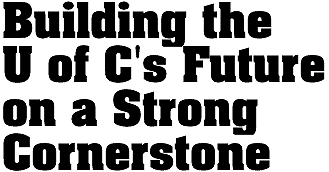
The University of Chicago Magazine
October-December 1996


Ensuring the University's strength means placing special emphasis on the College.
By Mary Ruth Yoe
Fresh from the record-breaking completion of the Campaign for the Next Century, the University of Chicago just had more good news. In 199697, three years ahead of schedule, the University will achieve its first balanced budget in six years.Buoyed by these successes, the University is now well-positioned to address an even more ambitious and imperative challenge: reinforcing the foundations of the institution's long-term academic distinction and strength. Meeting this challenge has been a recurrent theme in the University's history since the earliest days of William Rainey Harper's presidency. More recently, it was the subject of a spring 1996 letter from President Hugo F. Sonnenschein to the U of C faculty, outlining a course of action intended to "sustain and enhance the quality of our University in the long run."
President Sonnenschein has recommended that the University's plan for continued strength into the next century rest upon an already strong cornerstone: the undergraduate College. The goal is to make the College--whose academic programs and reputation have set a standard for higher education--more frequently "the school of choice for the most talented and committed students." As a University of Chicago education becomes even more sought after, Sonnenschein wrote, growth in the size and depth of the applicant pool could then be followed by an increase in the number of students enrolled in the College.
"We are the university best positioned to offer a truly exemplary liberal collegiate education. We represent the idealized picture."
In his letter to the faculty, Sonnenschein noted that Chicago, with its relatively small undergraduate and relatively large graduate populations, is the only university in its peer group whose net undergraduate tuition revenues do not even cover the wage base for the arts and sciences faculties. Thus, despite expanded fund-raising and the successful efforts to balance the University's operating budget, the U of C must work harder than its peers to ensure that faculty salaries, graduate fellowships, and research facilities are commensurate with the institution's insistence upon academic excellence.
Beyond providing resources, the act of increasing the number of outstanding applicants to Chicago and raising the College's profile will also have a positive "spillover" effect on the University's graduate divisions and professional schools. As is the case at many research universities, a stronger and more visible undergraduate college would augment the drawing power of post-collegiate academic programs.
In evaluating the wisdom of placing a heightened emphasis on the College, Sonnenschein wrote, the University community must consider "whether such a path is consistent with the values and history of the University and whether it will contribute to the betterment of society." The president himself subscribes to the view--succinctly expressed in a 1952 report to then Dean of the College F. Champion Ward--that "the College is more than an institution, it is a cause."
"In an era of dynamic change in knowledge and technology," Sonnenschein argues, "the benefit of liberal education to both the individual and society has never been greater. A liberal education remains the best preparation for a future we can only imagine, and the university that offers the very best liberal education has the opportunity, and I would argue the responsibility, to demonstrate the value of such an education."
"I believe we are the university best positioned to offer a truly exemplary liberal collegiate education," Sonnenschein wrote. "In important ways, we represent the idealized picture." By "teaching students to think and for transforming lives," by building a faculty "unsurpassed in making important discoveries," and by developing a Core that is a "benchmark for general education,"
Continue reading "Special Report"
Go to:
- INVESTIGATIONS
- CHICAGO JOURNAL
- EVENTS
- LETTERS
- CHICAGOPHILE
- Feature story, "The Strange Laboratory of Dr. LaBarbera"
- Feature story, "Strength in Numbers"
- Special Report, "Building a Strong Cornerstone"
- Feature story, "The Wirszup Factor"
- CLASS NEWS
- DEATHS
- BOOKS BY ALUMNI
- IN THE CLUBS
Return to October-December 1996 Table of Contents